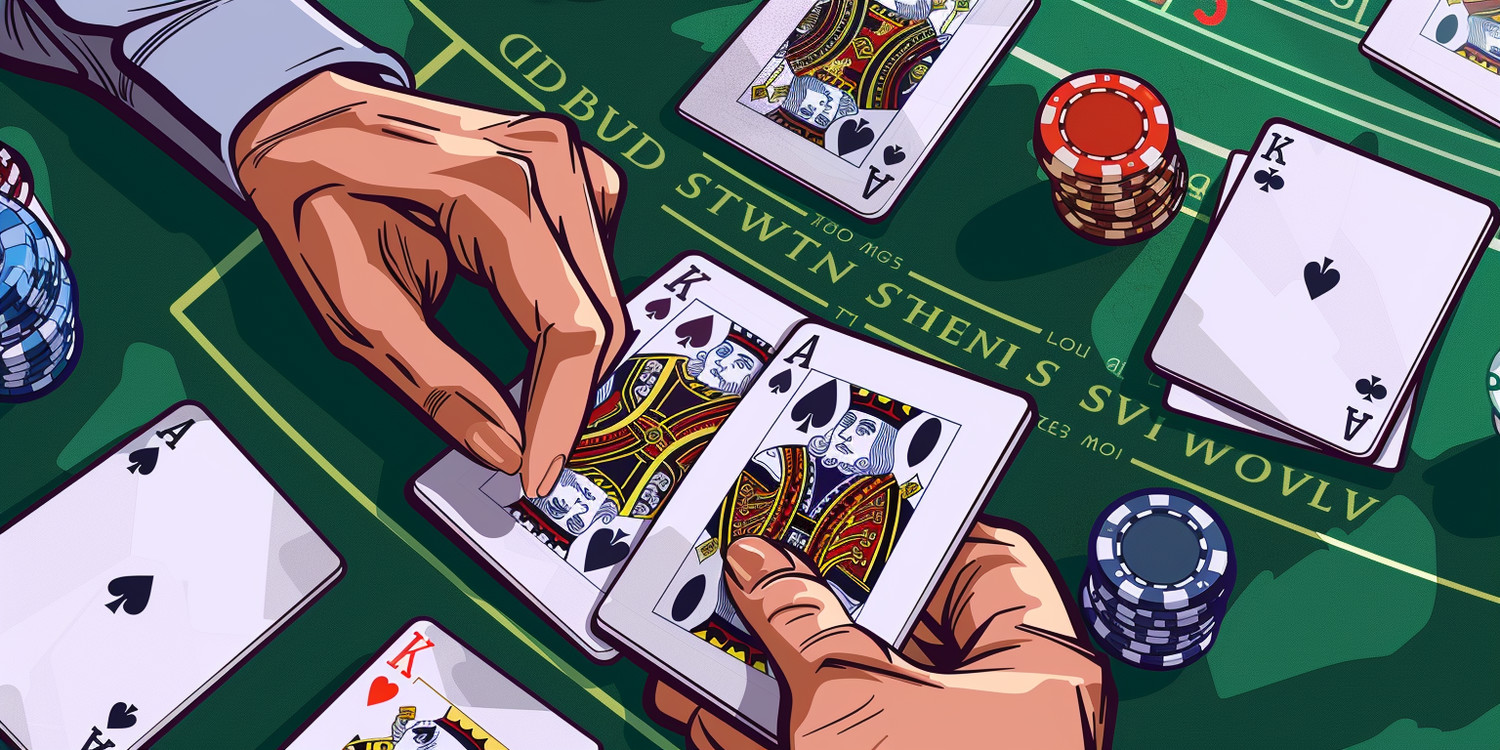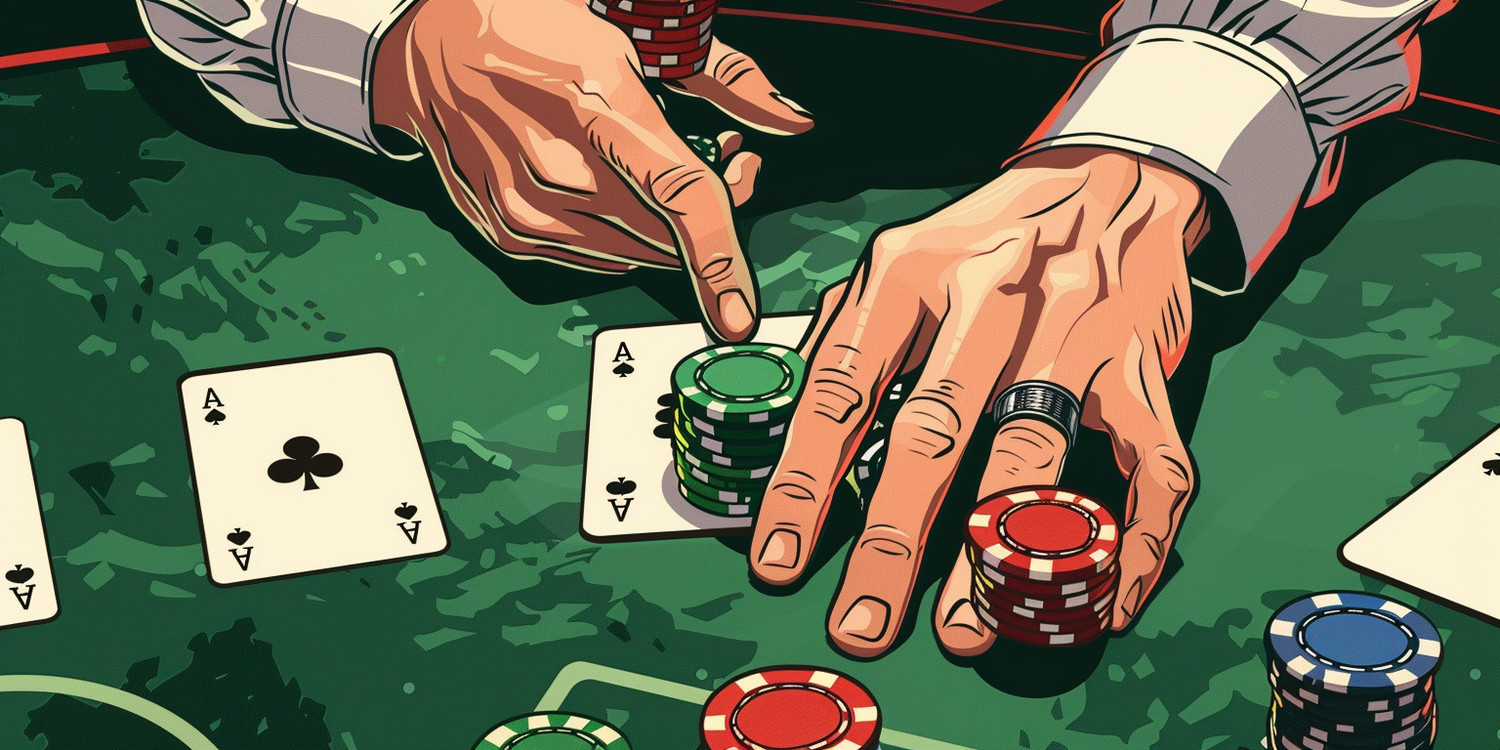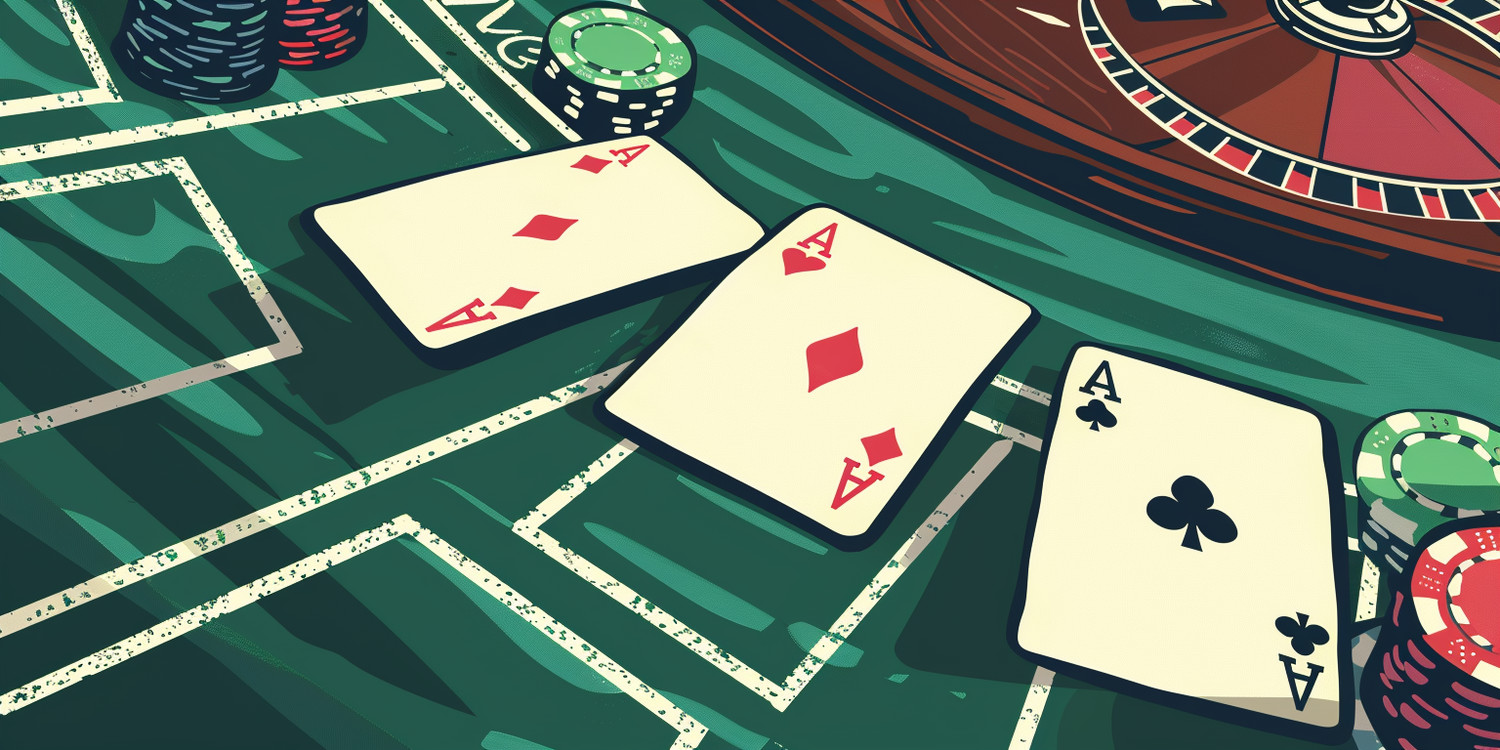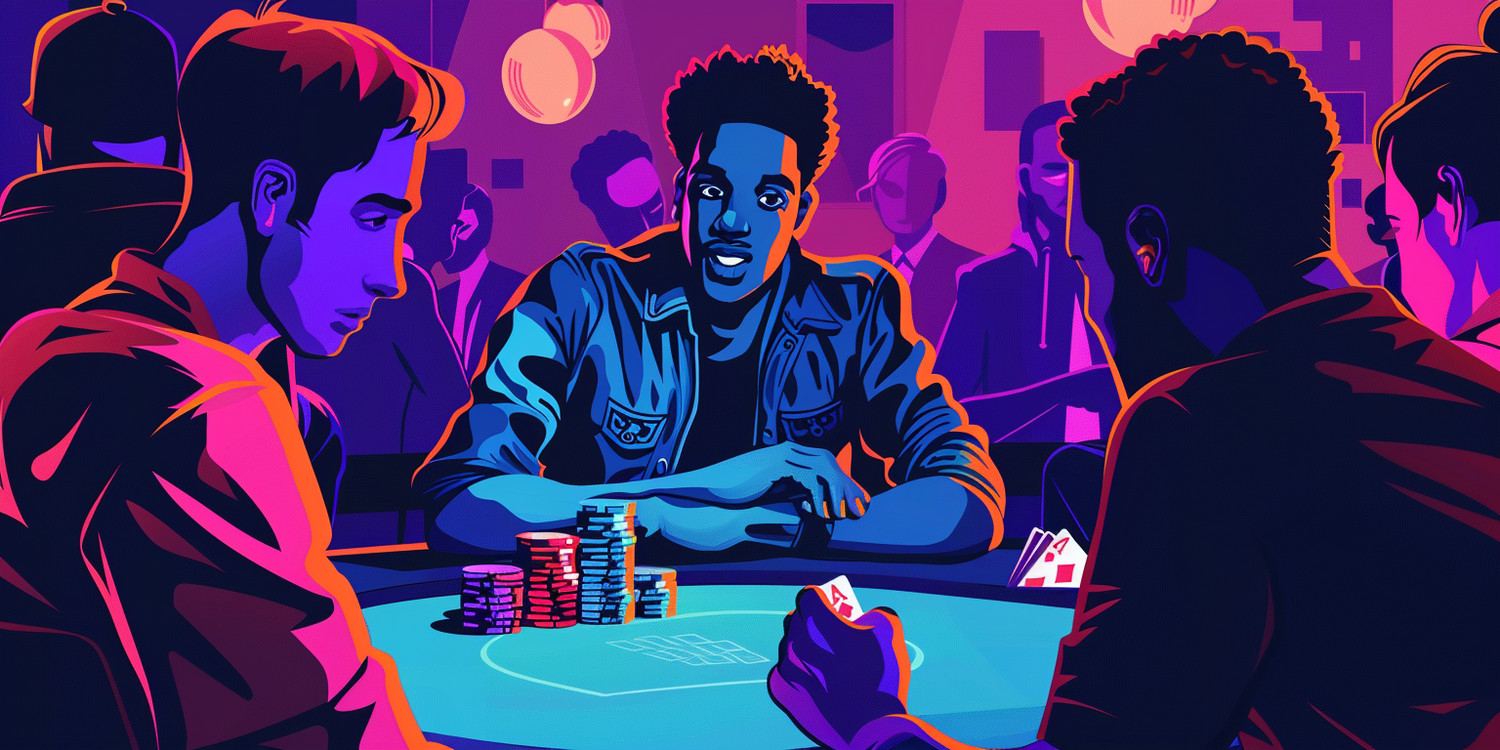
Blackjack, a staple in casinos, is rife with misunderstandings. This discourse aims to dissect prevailing fallacies, contrasting them with factual strategy.
Common Myths About Blackjack Strategy
Numerous misconceptions surround optimal blackjack play. These myths often lead to suboptimal decisions, increasing the house edge. Discerning fact is vital.
Myth 1: Blackjack is Purely a Game of Luck
A prevalent misconception posits that blackjack outcomes are solely governed by chance, akin to games like roulette or craps. This viewpoint suggests that players possess minimal influence over the hand’s trajectory, reducing the endeavor to a mere gamble. Proponents of this myth often dismiss the efficacy of strategic approaches, asserting that the shuffling of the deck renders any calculated maneuver inconsequential. The allure of this belief lies in its simplicity; it absolves players of the responsibility to learn and implement optimal strategies, attributing wins and losses to capricious fortune. This perspective, while seemingly straightforward, overlooks the intricate interplay between player decisions and probabilistic outcomes that define the true nature of blackjack. The assertion that luck reigns supreme negates the demonstrable impact of informed choices on mitigating risk and enhancing the probability of success. It is a perspective often embraced by novice players or those disinclined to delve into the strategic complexities inherent in the game.
Reality: Skill and Strategy Play a Significant Role
Contrary to the myth of pure luck, blackjack, when approached with informed strategy, presents a landscape where skill exerts a tangible influence on outcomes. The implementation of Basic Strategy, a mathematically derived set of optimal plays for each hand combination against the dealer’s upcard, demonstrably reduces the house edge. This strategy dictates when to hit, stand, double down, or split pairs, based on probabilistic calculations that maximize expected value. Furthermore, advanced techniques such as card counting, while not foolproof, provide astute players with the ability to track the ratio of high to low cards remaining in the deck, allowing them to adjust their wagers and playing decisions accordingly. This strategic adaptation, predicated on meticulous observation and calculation, shifts the odds in favor of the player. While luck undoubtedly plays a role in the short term, over an extended series of hands, the skillful application of strategy invariably leads to superior results. Therefore, blackjack transcends the realm of pure chance, emerging as a game where knowledge, discipline, and strategic acumen are paramount to achieving sustained success.
Misconceptions Regarding Card Counting
Card counting, a sophisticated blackjack technique, is often shrouded in myth. Misunderstandings about its legality and effectiveness are widespread among players.
Myth 2: Card Counting is Illegal
A pervasive misconception surrounding card counting is its purported illegality. This belief often stems from the perception that card counting constitutes cheating or unfair manipulation of the game. The image of surreptitious individuals covertly tracking cards and employing sophisticated devices to gain an illicit advantage perpetuates this notion. Furthermore, popular culture, through its portrayal of card counting in films and television, frequently reinforces this erroneous association with criminal activity. The misconception is further fueled by the secretive nature often associated with card counting, as practitioners typically avoid overt displays of their techniques to evade detection by casino personnel. This clandestine behavior inadvertently contributes to the perception that the activity is inherently unlawful. However, the reality is that card counting, in its purest form, is not illegal, as it relies solely on mental acuity and observation skills rather than external devices or collusion.
Reality: Card Counting is Legal, But Discouraged by Casinos
While card counting is not legally prohibited in most jurisdictions, casinos actively discourage the practice due to its potential to erode their profit margins. Card counting, at its core, involves using mental tracking to estimate the ratio of high-value cards to low-value cards remaining in the deck, thereby informing betting and playing decisions. This inherent skill does not constitute cheating, as it relies solely on observation and calculation, without the use of external devices or manipulation of the cards. However, casinos, as private establishments, reserve the right to refuse service to anyone they deem to be detrimental to their business interests. Consequently, suspected card counters may face measures such as being asked to leave the premises, having their play closely monitored, or even being added to a casino blacklist. The legality of card counting, therefore, exists in a precarious balance with the casinos’ prerogative to protect their financial interests, resulting in a dynamic where the practice is permissible but actively suppressed.
Myths About Player Impact on the Game

A common belief suggests that other players’ actions significantly affect one’s blackjack outcome. This notion often leads to frustration and misdirected blame.
Myth 3: Other Players Can Ruin Your Game
A pervasive myth in blackjack is the belief that the decisions of other players at the table can negatively impact one’s own chances of winning. This misconception often manifests as resentment towards players who deviate from basic strategy, particularly when they “hit” on stiff hands (12-16) against a dealer’s strong upcard, thereby drawing a card that the player believes would have otherwise improved their own hand or prevented the dealer from improving theirs. The frustration stemming from this perceived interference can lead to strained interactions and a sense of helplessness. This myth is further perpetuated by anecdotal experiences where a player’s seemingly irrational decision coincides with a subsequent downturn in the individual’s own fortunes, solidifying the belief in the causal relationship between other players’ actions and personal losses. The underlying assumption is that the deck has a finite number of favorable cards, and that other players are somehow depleting the pool of those cards, thereby diminishing one’s own odds.
Reality: Other Players’ Decisions Have Minimal Impact on Your Odds
In reality, the impact of other players’ decisions on your individual odds in blackjack is statistically minimal. While it is true that the cards dealt to other players alter the sequence of cards remaining in the deck, the overall effect on your long-term expected value is negligible. The primary determinant of your success remains your own adherence to basic strategy and, if applicable, your card counting proficiency. The belief that other players can “ruin” your game often stems from a misunderstanding of probability and the law of large numbers. Over a significant number of hands, the fluctuations caused by other players’ choices tend to even out, rendering their impact insignificant. Your own decisions, based on the dealer’s upcard and your hand, remain the most critical factors influencing your outcome. Therefore, focusing on your own strategy and minimizing emotional reactions to other players’ actions is paramount to maximizing your potential for success in blackjack. The focus should remain on optimal play, not on perceived interference.
Dealer-Related Misconceptions
Several misconceptions revolve around the dealer’s role and actions in blackjack. These often lead to flawed player strategies and unwarranted assumptions.
Myth 4: The Dealer Always Has a 10 in the Hole
A common and detrimental myth in blackjack is the assumption that the dealer invariably holds a ten-value card (10, Jack, Queen, or King) as their hole card. This belief often influences players to make suboptimal decisions, such as standing on relatively weak hands against a dealer’s low upcard, fearing that the dealer will easily complete their hand to a strong total. This misconception likely arises from the fact that ten-value cards constitute a significant proportion of the deck, leading players to overestimate the probability of the dealer possessing one. Furthermore, the human tendency to seek patterns and find explanations for random events reinforces this belief, as players may selectively remember instances where the dealer did, in fact, have a ten in the hole, while disregarding instances where they did not. This biased recollection contributes to the persistence of the myth, despite its lack of statistical validity. The assumption of a hidden ten can lead to overly conservative play, ultimately increasing the house edge.
Reality: The Dealer’s Hole Card is Random
The reality is that the dealer’s hole card is determined randomly by the shuffle of the deck, and the probability of it being a ten-value card is simply the proportion of ten-value cards in the deck, which is approximately 4/13 or 30.7%. While this is a significant percentage, it is far from a certainty, and assuming that the dealer always has a ten in the hole is a demonstrably flawed strategy. The correct approach is to base your decisions on the dealer’s upcard and your own hand, using basic strategy to determine the optimal play for each situation. Basic strategy takes into account the probability of various dealer outcomes based on their upcard, and it provides the mathematically soundest approach to maximizing your expected value. Abandoning basic strategy in favor of the assumption that the dealer has a ten in the hole will inevitably lead to suboptimal decisions and a higher house edge. Therefore, it is crucial to recognize the randomness of the dealer’s hole card and adhere to a statistically sound strategy.
Misunderstandings About Basic Strategy
Despite its proven efficacy, basic strategy is often misunderstood or disregarded. Common misconceptions undermine its value and lead to suboptimal play.
Myth 5: Ignoring Basic Strategy Doesn’t Matter
A prevalent and costly myth in blackjack is the notion that ignoring basic strategy has no significant impact on the outcome of the game. This belief often stems from a casual approach to blackjack, where players rely on intuition or gut feelings rather than adhering to a mathematically sound strategy. Some players may perceive basic strategy as overly complex or restrictive, preferring the freedom to make decisions based on their own subjective assessment of the situation. Furthermore, the short-term fluctuations inherent in blackjack can reinforce this belief, as players may experience temporary success while deviating from basic strategy, leading them to underestimate its long-term value. The allure of “playing their own game” and defying conventional wisdom can be particularly strong, especially for recreational players who prioritize enjoyment over maximizing their chances of winning. However, the disregard for basic strategy is a significant error that substantially increases the house edge and diminishes the player’s long-term prospects.
Reality: Basic Strategy Significantly Improves Your Odds
The reality is that adhering to basic strategy is paramount to maximizing your chances of winning at blackjack. Basic strategy is a mathematically derived set of optimal plays for every possible hand combination against each dealer upcard. It is based on extensive simulations and probability calculations, and it represents the statistically best decision to make in each situation, minimizing the house edge. By consistently following basic strategy, players can reduce the house edge to less than 1% in many blackjack variations. This is a significant improvement compared to the house edge faced by players who make arbitrary decisions. The benefits of basic strategy are most evident over a large number of hands, where the statistical advantage conferred by optimal play becomes increasingly apparent. While short-term fluctuations can still occur, in the long run, players who consistently adhere to basic strategy will outperform those who do not. Therefore, mastering and implementing basic strategy is a fundamental requirement for any serious blackjack player.
Myths About Winning Streaks and Losing Streaks

The perception of “streaks” in blackjack often leads to irrational betting and playing decisions. These myths are rooted in the gambler’s fallacy.
Myth 6: You’re Due for a Win After a Losing Streak
A pervasive myth that plagues gamblers, including blackjack players, is the belief that after experiencing a losing streak, a win is somehow “due.” This misconception stems from a cognitive bias known as the gambler’s fallacy, which is the erroneous belief that if something happens more frequently than normal during a given period, it will happen less frequently in the future, or vice versa. In the context of blackjack, this translates to the feeling that after several consecutive losses, the odds are somehow shifting in the player’s favor, making a win more likely. This belief can lead to increased betting during losing streaks, as players attempt to recoup their losses and capitalize on the perceived impending win. The fallacy arises from a misunderstanding of independent events. Each hand of blackjack is independent of the previous hand, and the outcome of past hands has no bearing on the outcome of future hands. The cards have no memory, and the probability of winning or losing remains constant regardless of previous results.
Reality: Each Hand is Independent; Past Results Don’t Influence Future Outcomes
The reality is that each hand of blackjack is an independent event, meaning that the outcome of previous hands has absolutely no influence on the outcome of the current hand. The probability of winning or losing remains constant for each hand, regardless of whether you have been on a winning streak or a losing streak. The cards do not “remember” past results, and the shuffle ensures that each new hand is dealt from a fresh, random distribution of cards. Therefore, the belief that you are “due” for a win after a losing streak is a fallacy. It is crucial to understand this fundamental principle of probability to avoid making irrational betting decisions based on the illusion of impending changes in fortune. Instead, players should focus on making optimal decisions based on the current hand and the dealer’s upcard, adhering to basic strategy and managing their bankroll responsibly. Recognizing the independence of each hand is essential for rational and successful blackjack play.
Common Betting Misconceptions
Many players fall prey to flawed betting systems, believing they can overcome the house edge. These systems are often based on false premises and wishful thinking.
Myth 7: Betting Systems Guarantee Wins
A deeply ingrained myth in gambling, including blackjack, is the belief that betting systems can guarantee wins and overcome the house edge. These systems often involve complex patterns of increasing or decreasing bets based on previous outcomes, with the underlying assumption that these patterns can somehow predict or influence future results. Examples include the Martingale system, where bets are doubled after each loss, and the Paroli system, where bets are doubled after each win. Proponents of these systems often tout their ability to recoup losses and generate consistent profits. The allure of a guaranteed win is particularly strong for players seeking to minimize risk and achieve financial success. However, the belief that betting systems can overcome the house edge is a fallacy rooted in a misunderstanding of probability and the independence of events. These systems may create the illusion of control, but they cannot alter the fundamental mathematical probabilities of the game.
Reality: Betting Systems Cannot Overcome the House Edge
The reality is that betting systems cannot overcome the house edge in blackjack or any other casino game with a fixed house edge. While these systems may create short-term fluctuations in winnings and losses, they do not alter the underlying probabilities of the game. The house edge represents the mathematical advantage that the casino has over the player, and it is built into the rules of the game. Betting systems may redistribute the risk, but they cannot eliminate it. For example, the Martingale system can lead to small, frequent wins, but it also carries the risk of large, devastating losses when a losing streak occurs. The Paroli system can amplify winnings during winning streaks, but it also exposes the player to increased losses when the streak ends. In the long run, the house edge will always prevail, and players who rely solely on betting systems will inevitably lose money. The only way to consistently win at blackjack is to either exploit dealer errors, card counting, or advantage play.
Myths About the Objective of Blackjack
A fundamental misunderstanding often exists regarding the true aim of blackjack. This misconception can lead to incorrect playing decisions and reduced odds.
Myth 8: The Objective is to Get as Close to 21 as Possible
A widespread misconception among novice blackjack players is that the primary objective is to get as close to 21 as possible without exceeding it. This belief often leads to overly aggressive play, where players hit on hands that should be stood upon, fearing that the dealer will get closer to 21. This approach neglects the crucial fact that the true objective is not to achieve the highest possible hand value, but rather to beat the dealer’s hand. The focus on reaching 21 can lead to ignoring basic strategy, as players prioritize chasing a high total over making the statistically optimal decision. This misconception can be particularly detrimental when facing a dealer with a weak upcard, where the player’s primary goal should be to avoid busting and allow the dealer to potentially bust instead. The allure of getting close to 21 is understandable, but it is a dangerous distraction from the true strategic imperative of the game.
Reality: The Objective is to Beat the Dealer’s Hand
The reality is that the true objective in blackjack is to beat the dealer’s hand, not necessarily to get as close to 21 as possible. You can beat the dealer in one of three ways: by having a higher hand value than the dealer without exceeding 21, by the dealer exceeding 21 (busting), or by having a blackjack (an Ace and a ten-value card) while the dealer does not. This understanding is crucial for making optimal playing decisions. For example, if the dealer shows a weak upcard (2-6), your primary goal should be to avoid busting, as the dealer is more likely to bust themselves. In these situations, it is often correct to stand on relatively low hands (e.g., 12-16) rather than risk busting by hitting. Conversely, if the dealer shows a strong upcard (7-Ace), you may need to take more risks to improve your hand and have a chance of beating the dealer’s likely strong total. Therefore, always consider the dealer’s upcard and adjust your strategy accordingly, keeping in mind that the ultimate goal is to beat the dealer’s hand.
Misconceptions About “Hot” and “Cold” Tables

The notion that some blackjack tables are inherently “hot” or “cold” is a persistent myth. This belief often influences table selection and betting strategies.
Myth 9: Some Tables are “Hot” or “Cold”
A common superstition among blackjack players is the belief that some tables are inherently “hot” or “cold,” meaning that they are either consistently paying out wins or consistently resulting in losses. This belief often leads players to “table hop,” moving from table to table in search of a “hot” table or avoiding a perceived “cold” table. The rationale behind this myth is the idea that the shuffle is not truly random, or that some tables are somehow “cursed” or “blessed.” Players may attribute past results at a particular table to the table’s inherent properties, rather than to random chance. This belief can be reinforced by anecdotal experiences, where a player may win several hands in a row at one table, leading them to conclude that the table is “hot.” Conversely, a series of losses at another table may lead them to believe that the table is “cold.” However, the notion of “hot” and “cold” tables is a fallacy rooted in a misunderstanding of randomness.
Reality: Table Conditions Don’t Affect the Odds
The reality is that the conditions of a blackjack table, such as recent wins or losses, do not affect the underlying odds of the game. Blackjack is a game of independent events, and the shuffle ensures that each hand is dealt from a fresh, random distribution of cards. The probability of winning or losing remains constant regardless of past results at that table. Therefore, the belief that some tables are inherently “hot” or “cold” is a fallacy. Moving from table to table in search of a perceived “hot” table is a futile exercise that has no impact on your long-term expected value. Instead of relying on superstitions, players should focus on making optimal decisions based on the current hand and the dealer’s upcard, adhering to basic strategy and managing their bankroll responsibly. The only factors that can affect the odds are rule variations (e.g., number of decks, dealer hitting on soft 17) and the player’s skill in implementing basic strategy or card counting techniques, not the table’s past performance.

